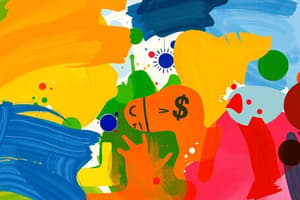Podcast
Questions and Answers
What does microeconomics primarily focus on?
What does microeconomics primarily focus on?
- Global trade agreements
- National policies and international economics
- Individual consumers and firms (correct)
- The economy as a whole
What concept describes the cost of giving up the next best alternative?
What concept describes the cost of giving up the next best alternative?
- Opportunity Cost (correct)
- Demand
- Scarcity
- Supply
Which of the following is NOT a key indicator in macroeconomics?
Which of the following is NOT a key indicator in macroeconomics?
- Market trends (correct)
- Inflation
- GDP
- Unemployment rates
In a mixed economy, what role do both government and private sector play?
In a mixed economy, what role do both government and private sector play?
Which economic theory emphasizes the role of government in managing economic cycles?
Which economic theory emphasizes the role of government in managing economic cycles?
What does inflation represent in economics?
What does inflation represent in economics?
Which policy tool is focused on government spending and taxation?
Which policy tool is focused on government spending and taxation?
What does the trade balance measure?
What does the trade balance measure?
Flashcards are hidden until you start studying
Study Notes
Key Concepts in Economics
- Definition: Economics is the study of how individuals, businesses, and societies allocate scarce resources to satisfy unlimited wants.
Major Branches
-
Microeconomics
- Focuses on individual consumers and firms.
- Analyzes supply and demand in specific markets.
- Examines the behavior of individuals and interactions in markets.
-
Macroeconomics
- Studies the economy as a whole.
- Key indicators: GDP, unemployment rates, inflation.
- Investigates national policies and international economics.
Fundamental Principles
- Scarcity: Limited resources vs. unlimited wants.
- Supply and Demand: The relationship between availability of goods and desire for them.
- Law of Demand: Price increase leads to quantity demanded decrease.
- Law of Supply: Price increase leads to quantity supplied increase.
- Opportunity Cost: The cost of forgoing the next best alternative when making a decision.
Economic Systems
-
Market Economy
- Decisions made by individuals and businesses.
- Prices determined by supply and demand.
-
Command Economy
- Central authority makes decisions about production and distribution.
- Examples: Planned economies.
-
Mixed Economy
- Combination of market and command economy elements.
- Government and private sector play a role in economic decisions.
Key Terms
- Gross Domestic Product (GDP): Total value of all goods and services produced in a country.
- Inflation: The rate at which the general level of prices for goods and services rises.
- Unemployment Rate: The percentage of the labor force that is jobless and actively seeking employment.
Economic Theories
- Classical Economics: Emphasizes free markets and self-regulating behavior.
- Keynesian Economics: Advocates for government intervention to manage economic cycles.
- Monetarism: Focuses on the role of government in controlling the amount of money in circulation.
Policy Tools
- Fiscal Policy: Government spending and taxation decisions.
- Monetary Policy: Central bank actions to control money supply and interest rates.
International Economics
- Trade: The exchange of goods and services between countries.
- Exchange Rates: The value of one currency in relation to another.
- Trade Balance: Difference between a country’s exports and imports.
Current Issues
- Globalization: Increased interconnectedness of economies.
- Income Inequality: Disparity in income distribution among a population.
- Environmental Economics: Study of the economic impact of environmental policies.
Economic Indicators
- Consumer Price Index (CPI): Measures changes in the price level of a market basket of consumer goods and services.
- Producer Price Index (PPI): Measures the average changes in selling prices received by domestic producers.
- Balance of Payments: A statement that summarizes an economy's transactions with the rest of the world.
Economics Definition
- The study of how individuals, businesses, and societies allocate scarce resources to satisfy unlimited wants.
Major Branches
- Microeconomics: Focuses on individual consumers and firms.
- Analyzes supply and demand in specific markets.
- Examines individual behavior and interactions in markets.
- Macroeconomics: Studies the economy as a whole.
- Key indicators: GDP, unemployment rates, inflation.
- Investigates national policies and international economics.
Fundamental Principles
- Scarcity: Limited resources vs. unlimited wants.
- Supply and Demand: Relationship between availability of goods and desire for them.
- Law of Demand: Price increase leads to quantity demanded decrease.
- Law of Supply: Price increase leads to quantity supplied increase.
- Opportunity Cost: The cost of forgoing the next best alternative when making a decision.
Economic Systems
- Market Economy: Decisions made by individuals and businesses.
- Prices determined by supply and demand.
- Command Economy: Central authority makes decisions about production and distribution.
- Examples: Planned economies.
- Mixed Economy: Combination of market and command economy elements.
- Government and private sector play a role in economic decisions.
Key Terms
- Gross Domestic Product (GDP): Total value of all goods and services produced in a country.
- Inflation: The rate at which the general level of prices for goods and services rises.
- Unemployment Rate: The percentage of the labor force that is jobless and actively seeking employment.
Economic Theories
- Classical Economics: Emphasizes free markets and self-regulating behavior.
- Keynesian Economics: Advocates for government intervention to manage economic cycles.
- Monetarism: Focuses on the role of government in controlling the amount of money in circulation.
Policy Tools
- Fiscal Policy: Government spending and taxation decisions.
- Monetary Policy: Central bank actions to control money supply and interest rates.
International Economics
- Trade: The exchange of goods and services between countries.
- Exchange Rates: The value of one currency in relation to another.
- Trade Balance: Difference between a country’s exports and imports.
Current Issues
- Globalization: Increased interconnectedness of economies.
- Income Inequality: Disparity in income distribution among a population.
- Environmental Economics: Study of the economic impact of environmental policies.
Economic Indicators
- Consumer Price Index (CPI): Measures changes in the price level of a market basket of consumer goods and services.
- Producer Price Index (PPI): Measures the average changes in selling prices received by domestic producers.
- Balance of Payments: A statement that summarizes an economy's transactions with the rest of the world.
Studying That Suits You
Use AI to generate personalized quizzes and flashcards to suit your learning preferences.




